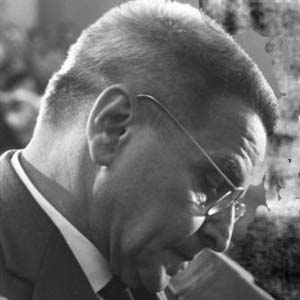Wolfgang Langhoff (born 6 October 1901 in Berlin, Germany; died: 26 August 1966 in Berlin, Germany) was a German theatre, film and television actor and theatre director.
From 1923 Langhoff worked at the Thalia Theater Hamburg, and in Wiesbaden. In 1926 he married the actress Renata Edwina Malacrida, who bore him two children, Thomas (1938) and Matthias (1942). From 1928 to 1932 he played at the Schauspielhaus in Düsseldorf and then from 1932–33 at the Grand Theatre in Düsseldorf. Langhoff was involved at this time with the German Communist Party and was the artistic director of the agitprop troupe “ran northwest,” founded in 1930, which performed at union events. The dancer Hilarius Gilges was one its members.
Langhoff was arrested by the Gestapo in February 1933 and initially detained in the Düsseldorf jail, where he was subjected to severe torture by the SA. A few days later he was transferred to the “Ulmer Höhe” prison. In July 1933 he was taken to concentration camp Börgermoor, in Emsland. While there he revised a song lyric written by Johann Esser, creating what was later to become the famous protest song Peat Bog Soldiers (Moorsoldaten). The melody was composed by another prisoner, Rudi Goguel. After the transfer to the Lichtenburg concentration camp, Langhoff was released as part of the so-called Easter amnesty in 1934. Overall, Langhoff spent 13 months in prisons and concentration camps.
Three months later – in June of that year – he fled to Switzerland, just before closure of the border. At the Schauspielhaus in Zurich, he found shelter and work as a director and actor. In 1935, he published the autobiographical memoir Rubber truncheon. Being an account of thirteen months spent in a concentration camp. After it was translated by Lilo Linke into English it became one of the first internationally known eyewitness accounts of brutality in the Nazi concentration camps. Langhoff was a founding member of the Free Germany Movement in Switzerland.
Langhoff played Eilif in the first production of Bertolt Brecht’s Mother Courage and Her Children, which opened at the Schauspielhaus Zürich on 19 April 1941. He also performed in the first production of Brecht’s Life of Galileo, which also opened at the Schauspielhaus Zürich, on 9 September 1943.
He played Ernst Mehlin in Konrad Wolf’s film Genesung (1956), von Geir in Nikola Korabov’s Tyutyun (1962), and Professor Holt in Joachim Kunert’s Die Abenteuer des Werner Holt (1965); he also appeared in Kurt Maetzig and Günter Reisch’s Das Lied der Matrosen (1958). On television, he appeared in Hans-Joachim Kasprzik’s mini-series Wolf Among Wolves (1965).
It is on the strength of his productions of classical texts at the Deutsches Theater in Berlin, a theatre which he led from 1946 to 1963, that Langhoff’s fame as a director rests. His notable productions there include: Goethe’s Faust (1949 and 1954, productions in which he also played Mephisto) and Egmont(1951), Schiller’s Don Carlos (1952), Shakespeare’s King Lear (1957) and Lessing’s Minna of Barnhelm (1960).


10 thoughts on “Kaminos”
Was Nicholas related to Alexander Saslavsky who married Celeste Izolee Todd?
Anyone have a contact email for Yair Klinger or link to score for Ha-Bayta?
wish to have homeland concert video played on the big screen throughout North America.
can organize here in Santa Barbara California.
contacts for this needed and any ideas or suggestions welcomed.
Nat farber is my great grandpa 😊
Are there any movies or photos of max kletter? His wife’s sister was my stepmother, so I’m interested in seeing them and sharing them with his wife’s daughter.
The article says Sheb recorded his last song just 4 days before he died, but does not tell us the name of it. I be curious what it was. I’d like to hear it.
Would anyone happen to know where I can find a copy of the sheet music for a Gil Aldema Choral (SATB) arrangement for Naomi Shemer’s “Sheleg Al Iri”. (Snow on my Village)?
Joseph Smith
Kol Ram Community Choir, NYC
שלום שמעון!
לא שכחתי אותך. עזבתי את ישראל בפברואר 1998 כדי להביא את בני האוטיסט לקבל את העזרה המקצועית שלא הייתה קיימת אז בישראל. זה סיפור מאוד עצוב וטרגי, אבל אני הייתי היחיד עם ביצים שהביא אותו והייתי הורה יחיד בשבילו במשך חמישה חודשים. הוא היה אז בן 9. כעת הוא בן 36 ומתפקד באופן עצמאי. נתתי לו הזדמנות לעתיד נורמלי. בטח, אבות כולם חרא, אומרים הפמינציות, אבל כולם צריכים לעבוד כמטרות במטווחי רובה!
משה קונג
(Maurice King)
Thank you for this wonderful remembrance of Herman Zalis. My late father, Henry Wahrman, was one of his students. Note the correct spelling of his name for future reference. Thank you again for sharing this.
Tirza Wahrman (Mitlak)
amazing zchuso yagein aleinu, he wrote the famous niggun Lefichuch that is sung in almost every Israeli Yeshiva